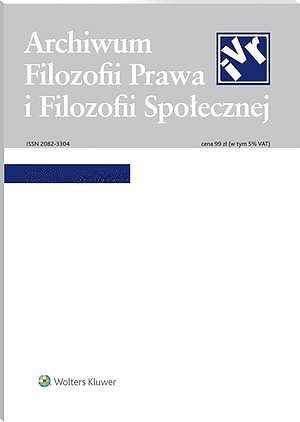Stan wyjątkowy i stan bez nazwy w myśli Carla Schmitta. Propozycja rozdzielenia
State of Emergency and State without a Name in Carl Schmitt’s Thought. Suggestion of a Separation
Author(s): Wojciech EngelkingSubject(s): Law, Constitution, Jurisprudence, Philosophy of Law
Published by: Stowarzyszenie Filozofii Prawa i Filozofii Społecznej – Sekcja Polska IVR
Keywords: Carl Schmitt; state of emergency; state without a name; katechon; political theology
Summary/Abstract: The concept of a state of emergency is one of the most frequently cited elements of the thought of the German philosopher of the law and political theorist Carl Schmitt. In its discussions, however, the conceptualization of the state of emergency, which Schmitt proposed in 1924 in his juridical comments on Article 48 of the Weimar Republic’s constitution, is often linked with the theory of Ausnahmezustand from Political Theology (1922). Such a juxtaposition is a mistake, because Schmitt was not a consistent thinker and his texts can be mutually contradictory. I propose, therefore, to separate the state of emergency from Ausnahmezustand – translated from German literally as a state without a name. The main difference between them consists in the different types of legitimacy. The state of emergency from the Constitution of the Weimar Republic finds its legitimacy in this document from 1919, however, read by Schmitt in a way that in his Constitutional Theory (1928) he referred to as relativization of the constitution. For the state without a name, as not being included in the legal order and the equivalent of a miracle in theology, such legitimacy is impossible. In order to find it, one must refer to other Schmitt’s works than the strictly judicial ones. I believe that the state without a name may be legally valid – in a word: not a coup d’état – if we acknowledge that Schmitt’s political theology is not just a methodological project that translates theological notions into political and legal ones, but a wider proposal rooted in the faith in Revelation. Therefore, this figure from the work of the German thinker in which the state of emergency finds its legitimacy is taken from St. Paul’s letters; it is the figure of a katechon: the one who comes and stops the world from disintegration. The use of such legitimacy emphasizes the reluctance to accept modernity, which Schmitt did exhibit, and presents him as a thinker who continued the medieval way of thinking, which is completely incompatible with the strictly modern concept of a state of emergency.
Journal: Archiwum Filozofii Prawa i Filozofii Społecznej
- Issue Year: 19/2019
- Issue No: 1
- Page Range: 15-26
- Page Count: 12
- Language: Polish

